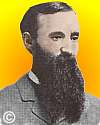
On 7 Sep 1840, Thomas Childs Crowell was born, an American inventor from Cape Cod, Massachusetts whose invention ought to be a household name because his machinery made a very useful product that is likely in every American home. Even thought it came before Thomas Edison's incandescent light bulb, Crowell's name is virtually unknown, except around his home town.
That's a pity, because Crowell invented machinery to make the square-bottomed paper grocery bag that will stand open ready to compactly load far more groceries than the plastic bags that have nearly ousted it. Paper, please! Several such paper bags stand up together for transport in the car, too, without spawling their contents like formless, wimpy plastic bags.
But today's feature draws your attention to his curious first patent (of more than 280 in his lifetime). This article on Luther Childs Crowell, by your Webmaster, gives a short biographical introduction, and leads on to the patent drawings and description of an “Aerial Machine” that had some ideas ahead of its time for a VTOL (Vertical Take-off And Landing) airplane. He created his idea forty years ahead of the Wright Brothers' first powered flight, and even further ahead of any modern helicopter. Oh... well, no, it didn't actually work. But don't let that stop you from casting an eye at his innovative thinking. At the time he was thinking out of the box. Or out of the bag (which came with his next invention).

On 7 Sep 1922, Dr. William Halstead died, the American surgeon who established the first U.S. surgical school. He is regarded as one of the greatest surgeon in American history because he modernized medicine - introducing such life-sparing novelties as anesthesia, scrubsuits, rubber gloves, handwashing, sterlized instruments, even while the medical establishment strenuously resisted his innovations. Today's book pick is: Genius on the Edge: The Bizarre Double Life of Dr. William Stewart Halsted, by Gerald Imber who also introduces how Halstead explored various methods of anesthesia, with self-experimentation, including with the then recently discovered drug, cocaine. He became addicted. Nevertheless, he was able to not only function but also continue a brilliant career. The intrigue-filled and intense strangeness of Halsted’s career is laid out by the author in a gripping story. Gerald Imber has captured in one grisly sweep the barbarism of both early surgery and the manure-trodden streets it grew from.
It is available from Amazon, typically about New from $35.00. Used from $5.00. (As of earlier time of writing - subject to change.)
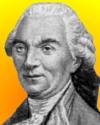 | In general, the more one augments the number of divisions of the productions of nature, the more one approaches the truth, since in nature only individuals exist, while genera, orders, and classes only exist in our imagination. |
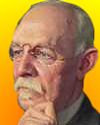 | The only weapon with which the unconscious patient can immediately retaliate upon the incompetent surgeon is hemorrhage. |
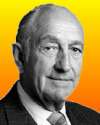 | Take risks. Ask big questions. Don't be afraid to make mistakes; if you don't make mistakes, you're not reaching far enough. |
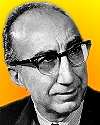 | Success is achievable without public recognition, and the world has many unsung heroes. The teacher who inspires you to pursue your education to your ultimate ability is a success. The parents who taught you the noblest human principles are a success. The coach who shows you the importance of teamwork is a success. The spiritual leader who instills in you spiritual values and faith is a success. The relatives, friends, and neighbors with whom you develop a reciprocal relationship of respect and support - they, too, are successes. The most menial workers can properly consider themselves successful if they perform their best and if the product of their work is of service to humanity. |
| Before you look at today's web page, see if you can answer some of these questions about the events that happened on this day. Some of the names are very familiar. Others will likely stump you. Tickle your curiosity with these questions, then check your answers on today's web page. | |
| Births | |
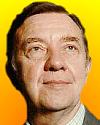 | An American physicist, born 7 Sep 1914, discovered radiation belts, two zones of radiation encircling the Earth, and brought about new understanding of cosmic radiation and its effects upon the Earth. What is the name of the physicist after whom these radiation belts are named? |
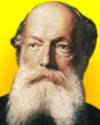 | (Friedrich) August Kekulé von Stradonitz was born 7 Sep 1829. He had intended to be an architect when he entered the University of Giessen but changed his career goals. What was his career field? |
| Deaths | |
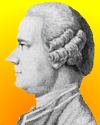 | Jan Ingenhousz (1730-1799) was a Dutch physician and biochemist. What is his best known discovery? |
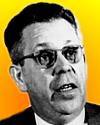 | Percy Spencer (1894-1970) is credited as the American engineer who invented the microwave oven. It was the outcome of his experiments at Raytheon with a device originally used during World War II for producing radar microwaves. What is the name of the microwave-producing component? |
| Events | |
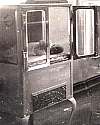 | On 7 Sep of a certain year, Edith Eleanor McLean became the first baby to be placed in an incubator. She weighed 2 pounds, 7 ounces. Originally, the incubator was called a “hatching cradle.” What was the decade of this event? |
Fast answers for the previous newsletter for September 6: caesium • atomic theory • smokeless (so battles were not obscured by smoke clouds of gunpowder weapons) • Jeep • decade of 1879 • it was a German V-2 rocket captured in WW II.
 If you enjoy this newsletter, the website, or wish to offer encouragement or ideas, please send feedback by using your mail reader Reply button.
If you enjoy this newsletter, the website, or wish to offer encouragement or ideas, please send feedback by using your mail reader Reply button. Your click on a Facebook, StumbleUpon, or other social button on the site webpages is also a welcome sign of appreciation. Thank you for using them.
© This newsletter is copyright 2020 by todayinsci.com. Please respect the Webmaster's wishes and do not put copies online of the Newsletter — or any Today in Science History webpage. (If you already have done so, please remove them. Thank you.) Offline use in education is encouraged such as a printout on a bulletin board, or projected for classroom viewing. Online, descriptive links to our pages are welcomed, as these will provide a reader with the most recent revisions, additions and/or corrections of a webpage. For any other copyright questions, please contact the Webmaster by using your mail reader Reply button.
--
If you do not want to receive any more newsletters, Unsubscribe
To update your preferences and to unsubscribe visit this link
Executive Real Estate Business Class
-
"It was like a man with wings. It wasn't like anything you'd see on TV or in a monster movie." ...
About the publisher
Search This Blog
Blog Archive
-
▼
2021
(585)
-
▼
September
(95)
- 800-Year-Old Tomb Discovered in Peru
- 600-Year-Old Muisca Jars Recovered in Colombia
- Human Footprints in North America Dated to 23,000 ...
- September Quiz
- Gas pipe workers find 800-year-old burial bundles
- Gas pipe workers find 800-year-old burial bundles
- Dark Destiny!
- Long-Distance Trade Detected in Genomes of Siberia...
- Composition of Stone Tools From Roman Morocco Anal...
- New Thoughts on Maya Pyramid in El Salvador
- This Civil War–Era Eagle Sculpture Was Made Out of...
- Roman gold coins found off coast of Spain
- Roman gold coins found off coast of Spain
- Review of The Bombay Prince by Sujata Massey, a my...
- DNA Analysis Identifies Japanese Ancestors
- Ritual Objects Discovered in Northern Egypt
- 'Band of Brothers' Stars Reflect on the Epic Minis...
- ‘Cake mummy’ survived WWII bombing of Lübeck
- ‘Cake mummy’ survived WWII bombing of Lübeck
- Am I my heroines?
- Medieval Mass Graves Excavated in Lebanon
- Three Phases of Wooden Wagon Way Uncovered in Scot...
- Rare Shell Artifacts Discovered in South Australia
- Burned Layer at Jamestown Linked to Bacon’s Rebellion
- Burned Layer at Jamestown Linked to Bacon’s Rebellion
- Painted 14th c. burial vaults found in Bruges
- Painted 14th c. burial vaults found in Bruges
- Possible Grave of Medieval Christian Hermit Excava...
- My notebook and I got drenched and my story was bo...
- Woman buried with heavy bronze jewelry found in in...
- Woman buried with heavy bronze jewelry found in in...
- Birthdays in History
- Teaching "All Men are Created Equal" (Part II)
- Psychologically Speaking, Who Were the Heads of th...
- Christmas Roses
- For Constitution Day, Let's Toast the Losers of th...
- We are All Becoming Cassandras: Leaders Must Heed ...
- Inequality Tends to Reach Political Tipping Points...
- The Roundup Top Ten for September 17, 2021
- Memo From Irish History: Welcome to Your Future, A...
- Rediscovered early drawing by Van Gogh on display
- Rediscovered early drawing by Van Gogh on display
- Hispano-Visigothic grave found at Spain cave hermi...
- Hispano-Visigothic grave found at Spain cave hermi...
- Searching for the Fisher Kings
- Bone Tools in Morocco May Be Earliest Evidence of ...
- Did Eurasia’s Early Bronze Age Pastoralists Drink ...
- The Trousseau
- Wood lion head recovered from Finnish shipwreck
- Wood lion head recovered from Finnish shipwreck
- The Floating Book by Michelle Lovric, a sensual no...
- Sculpture of Lord Ganesha Uncovered in Southeaster...
- Saudi Arabia’s Rock-Cut Camels Redated
- Possible Parietal Art Discovered on the Tibetan Pl...
- Renaissance shield looted by Nazis returned to Cze...
- Renaissance shield looted by Nazis returned to Cze...
- Anglo-Saxon Silver Brooch Recovered in England
- Roman Sewer System Discovered in Turkey
- Face of “Dutch Neanderthal” Reconstructed
- Gupta-Period Temple Found in Northern India
- The Polynesian 'Prince' Who Took 18th-Century Engl...
- When George Washington Took a Road Trip to Unify t...
- On 9/11, a Flotilla of Ferries, Yachts and Tugboat...
- Southern Tomb in Djoser funerary complex opened
- Southern Tomb in Djoser funerary complex opened
- Ask A Wench — What We've Been Watching
- Possible Prehistoric Campsite Uncovered in Norther...
- Statue of Roman Emperor Hadrian Unearthed in Turkey
- When George Washington Took a Road Trip to Unify t...
- Byzantine-era axe, machete found in ancient city
- Byzantine-era axe, machete found in ancient city
- Early Hollywood is a family affair in The Limits o...
- Maya rulers installed in Met’s Great Hall
- An Interview with Susanna Kearsley
- ENTER THE HEART OF DARKNESS | Legend of the Supers...
- ENTER THE HEART OF DARKNESS | Legend of the Supers...
- The Disturbing Case of Xavier Dupont de Ligonnès
- Newsletter for Sunday 12 September.
- Newsletter for Saturday 11 September.
- ‘Rise and Fall: The World Trade Center’ Premieres ...
- Newsletter for Friday 10 September.
- Newsletter for Thursday 9 September.
- Newsletter for Wednesday 8 September.
- Holiday savings - extended!
- Support Black-Owned Businesses: 181 Places to Star...
- Newsletter for Tuesday 7 September.
- Holiday savings for the whole family!
- Newsletter for Monday 6 September.
- Three All-New 9/11 Documentaries
- Newsletter for Sunday 5 September.
- Newsletter for Saturday 4 September.
- Labor Day Sale at the History Store
- Newsletter for Friday 3 September.
- Newsletter for Thursday 2 September.
- Newsletter for Wednesday 1 September.
-
▼
September
(95)
-
Blogroll
-
About
HistoryFact










0 comments:
Post a Comment